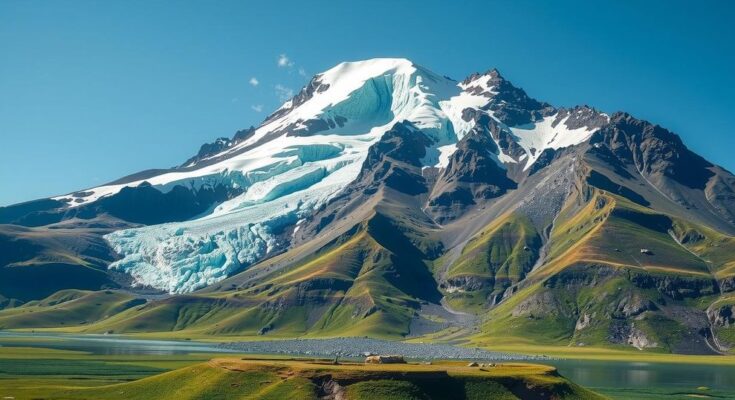The glaciers of the Rwenzori mountains in Uganda are melting at alarming rates, threatening local communities reliant on their water supply. Scientists are collaborating with residents to implement flood monitoring systems. Cultural significance and historical practices emphasize the need for sustainable environmental stewardship in the face of inevitable glacier loss.
The Rwenzori mountains in Uganda, home to Africa’s last remaining glaciers, are witnessing rapid melting, threatening local villages that depend on the glacial water. These glaciers, which are diminishing swiftly, may disappear by 2030 or earlier. Scientists, led by Dr. John Sekajugo, are collaborating with local communities to establish monitoring systems capable of predicting floods and raising awareness of environmental risks.
The historical significance of the Rwenzori mountains is paramount as they have been a water source for local populations for millennia. With the melting glaciers disrupting vital water cycles, locals face increased vulnerability to floods and landslides, altering the natural landscape and impacting livelihoods. Community members, like farmer Zephanas Masereka, recall damaging landslides while lamenting the losses inflicted on their homes and crops.
The cultural implications of the glacier’s disappearance are profound for the Bakonzo and Batoro people, who revere the mountains as sacred. Anthropologist Dr. Bosco Bwambale illustrates the mountain’s spiritual significance, noting the importance of traditional ecological practices in maintaining environmental harmony. These ancestral customs emphasize a respectful coexistence with nature, including planting trees that prevent soil erosion, promoting resilience against environmental hazards.
Various civil society organizations are working to restore this lost connection, employing indigenous ecological knowledge to combat degradation. Benon Bwalhuma, an agroforestry specialist, emphasizes the importance of using native plants to restore soil health and mitigate flooding risks. Meanwhile, local farmers like Kezia Bunehezi share their experiences of adapting farming methods to sustain their families amidst changing environmental conditions.
The ongoing melting of the Rwenzori glaciers signals an impending ecological and cultural disaster. Reviving ancient conservation practices and fostering sustainable agricultural techniques are crucial to preserving the region’s biodiversity and supporting the livelihoods of the communities dependent on these glaciers. Without immediate action, the fate of both the glaciers and the culture they nourish hangs in a precarious balance.
The rapid melting of the Rwenzori glaciers poses a significant threat to local communities in Uganda, which rely on glacial water for their livelihoods. As both an environmental and cultural issue, it is imperative to integrate indigenous knowledge into conservation efforts. Reviving traditional ecological practices may provide a sustainable path forward, enabling communities to adapt and thrive despite the challenges posed by climate change and environmental degradation.
Original Source: www.telegraph.co.uk




